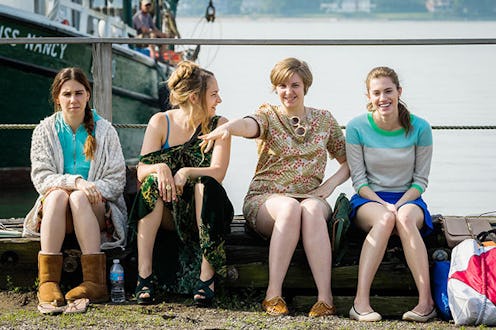Entertainment
The Girls of 'Girls' are Not Actually Those Girls

People are quick to assume that all women in their twenties are blindingly unaware. And sure, many are (as are many of the boys). Nowhere in TV is this more evident than in the discussions surrounding the actresses on HBO's Girls . People have a particularly hard time separating the two on Lena Dunham's divisive and brilliant takedown of the inherent terribleness of middle class self-entitlement and twentysomething coming-of-age. But that doesn't mean the women who are portraying flawed, selfish and self-destructive characters are that way themselves. And frankly, the whole idea is pretty ageist and sexist.
When it comes to the three most divisive characters on the show — Hannah, Jessa, and Shoshanna — people cannot seem to separate the girls from, well, the GIRLS. Following an appearance on Chelsea Lately , the host, Chelsea Handler said to Shoshanna's real-life counterpart Zosia Mamet, "This means you're an incredible actress, because ... her character on the show... you're a complete mess, a lunatic. I had no idea you'd be so normal in person."
In an interview with Vulture, Jemima Kirke (Jessa) mused that "for some reason, people think I'm Jessa," explaining that "I do notice that it's there and I sometimes try to explain that away and explain that it's not the case. It's easy to do that, I suppose, to associate the person with the character. I guess. I don't know." She followed up with a quick, "Maybe it does bug me, actually."
And to that we say: fuck yes it should. It's demeaning and insulting to the actresses' intelligence and Dunham's self-awareness as a writer/creator. In a new interview with The Guardian, the story's author is quick to compare the show to Sex and the City (groan) and call Dunham "surprisingly together." Not all that offensive, if misguided, considering the creator's tendency to mine her lifetime of neurosis for television fodder. But still: the disconnect remains in audience's inability to — even though we all seem more than capable of such a task with, oh, any other television show that isn't reality fare — see Dunham and Horvath as two separate entities. As one extreme, tailor-made take on this particular made-up character's life, trumped up for comedic effect, Dunham's connection to Horvath is purposefully hyper-examined in hopes of finding the latchkey to a hidden "truth" that Dunham and Co. are actually exactly these people and lying to the press about their own insight and intelligence.
The questions were constantly comparing the two: Was she regarded as wayward? Was she better behaved than Horvath? But Dunham comes across as so eager-to-please! Surely, she must be a carbon copy of Horvath. Dunham's sex life is another point of contention: "Because of the way I write, people think that I probably had a million boyfriends and was out dating every night, trying to figure it out. But I only had, like, three boyfriends, real boyfriends, before I met Jack [Antonoff, Dunham's boyfriend of two years]. I casually dated other people, but definitely didn't have a wild time." It's a classic case of "if A is to B as B is to C, then A and C are the same," which any SAT-prepped student can deduce is a load of transitive horse shit.
Ultimately, what people believe are the universally acceptable aspects of female existence appropriate enough to be portrayed on television are paper-thin, flavor-of-the-week constructs. With the seeming perma-association with former HBO series Sex and the City — a polar opposite of Girls in pretty much any and every way, regardless of how hard writers try to jerry-rig the comparison — society says, "look, this is our barometer for female depictions. Step anywhere outside this box and you're screwed," basically. The material excesses of the characters' lives of Sex and the City, juxtaposed to outlandish sexcapades, were of no concern to audiences because they could be in some universe. The women were given a sense of security and place in the world.
There's an inherent ageism and sexism when people view Girls — how could these actors be so together? No one is together in their twenties! — that, when juxtaposed with the series' harsh-light formula and the occasional pulled-from-real-life storylines Dunham punches up for television, seem to make it a challenge (to put it diplomatically) for some viewers to separate the two. As if self-awareness were only for the old.
Image: HBO [2]; RichJuz/Twitter [1]